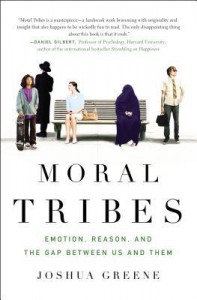86
Followers
34
Following
Seriously, Read a Book!
Thoughts on books, often interpreted through the high-brow prism of cartoon (read: Archer) references. Wait! I had something for this...
Currently reading
Land of LISP: Learn to Program in LISP, One Game at a Time!
The Sketchnote Handbook: The Illustrated Guide to Visual Notetaking
The Antidote
The Kind Worth Killing
James Buchanan
Moral Tribes: Emotion, Reason, and the Gap Between Us and Them
 I'm gonna go ahead and assume that there are summaries out there that will tell you what this book is about, so I'm just gonna tell you why I think it was pretty great.
I'm gonna go ahead and assume that there are summaries out there that will tell you what this book is about, so I'm just gonna tell you why I think it was pretty great.1. It's enormously readable - True to his affiliation as a utilitarian, Greene keeps his arguments clear and fairly concise. When he's gonna go more into depth on something that isn't crucial to understanding his overall point he tells you to go for it and skip ahead.
2. He summarizes the arguments of a lot of authors/books that I have enjoyed reading, but that might be less accessible. So, yay for TL;DR versions of a lot of Steven Pinker, Jonathan Haidt, Paul Bloom, and then the brigade of classic moral philosophers (e.g. Kant, Bentham and Mills etc.)
3. and beyond Whether or not you come out of this agreeing with Greene, you will have a much better, disambiguated sense of key concepts in moral philosophy/psychology, moral cognition and of the overall utilitarian (which he calls deep pragmatism) approach to moral philosophy.
The last time I read anything on utilitarianism I just remember walking away from it wanting to push [a:Peter Singer|12397|Peter Singer|https://d202m5krfqbpi5.cloudfront.net/authors/1255667717p2/12397.jpg] in front of a trolley. (That's a joke, by the way, if you're not much of a trolley-ologist.) There are a bunch of ways in which utilitarianism is often (according to Greene) misconstrued, but the one that resonated most with me was Greene's response to the idea that "Utilitarianism requires you to turn yourself into a happiness pump."
This is what turned me off to, at the very least, Peter Singer's utilitarianism, but Greene brings up a really great point:
There's a social dimension to the problem that may, in the long run, favor strong efforts over heroic ones. Your life is a model for others...If you improve the lives of hundreds of people every year through your charitable donations, but your life remains happy and comfortable, you're a model that others can emulate. If, instead, you push yourself to just shy of your breaking point, you may do more good directly with your personal donation dollars, but you may undermine the larger cause by making an unappealing example...
Yes! This is the point I wish I had been coherently able to make to the vegan in one of my classes (note: I am a non-dairy consuming vegetarian) who wouldn't drink beer because of the yeast in it. I'm sure there's some argument to be made for his case, but I just felt like he made vegetarianism and veganism seem absurd. And ridiculous. Ok, I'll move on.

This book is applied moral psychology. He explains how our brains work, why we might think the ways we do, when our intuitive thinking is useful, and when it causes trouble for us. What Greene addresses is how we, as a society, might be better off addressing issues that are controversial. He doesn't solve these issues, but he makes a good case for why (as we tend to do) having each side justify its own beliefs is a recipe for polarization and disaster.
 1
1










